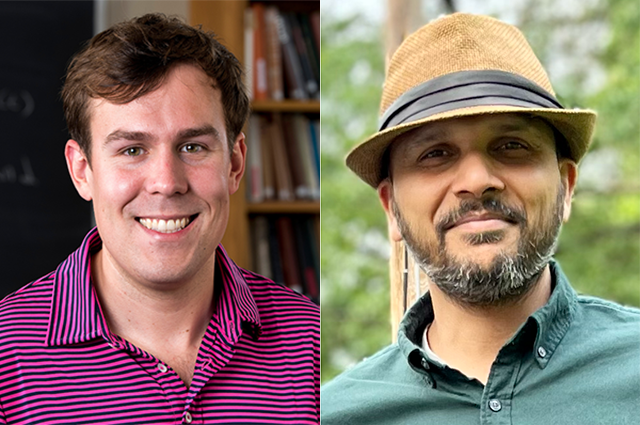Low-dimensional structures, learning, and algorithms in the space of measures

A Tufts team led by Assistant Professor James Murphy of the Department of Mathematics and Associate Professor Shuchin Aeron of the Department of Electrical and Computer Engineering was awarded a grant by the National Science Foundation (NSF) for their research in developing efficient methods for statistical and computational data analysis. The team plans to devise these methods by treating large and complex data, such as images and text documents, as probability measures. The project prioritizes theoretical foundations and scalable algorithms that are easily interpretable in comparison with other methods. A crucial component of the project involves training Tufts PhD and undergraduate students as well as visiting Research Experiences for Undergraduates (REU) students.
Regular collaboration among faculty members from different departments at Tufts leads to innovative approaches and solutions. This research project brings together Murphy’s and Aeron’s individual expertises to explore the intersection of their fields and further data analysis methods. Murphy, of the Department of Mathematics, holds secondary appointments in the Departments of Computer Science and Electrical and Computer Engineering. His research is in applied harmonic analysis, mathematics of data science, probability and statistics, and image, signal, and network processing. Aeron, of the Department of Electrical and Computer Engineering, has secondary appointments in the Departments of Mathematics and Computer Science. His research interests include tensor data analytics, high-dimensional statistics, information theory, and more recently theory and applications of optimal transport.
In their research, the investigators approach data analysis by considering “data as measures” embedded in a metric space equipped with the Wasserstein or earth mover’s distance (EMD). Wasserstein distance measures the minimal cost of reshaping one measure into another. In this framework, the research aims to build and investigate low-complexity (e.g., parameterized by a class of reference measures) models analogous to the prevalent low-dimensional models in traditional vector spaces. This will enable efficient (statistically robust and computationally feasible) synthesis and analysis of observed data. Drawing from their diverse research backgrounds, the collaborative efforts of Murphy and Aeron promise to explore significant new possibilities at the intersection of mathematics, computer science, and engineering. Beyond this interdisciplinary achievement, the proposed framework will have immediate benefits for application domains such as geoscience, computer vision, physics, and geography.
Read more about this research award, and learn more about Assistant Professor James Murphy and Associate Professor Shuchin Aeron.
The content of this article is solely the responsibility of the authors and does not necessarily represent the official views of the National Science Foundation. Research reported in this article is supported by the National Science Foundation under award number 2309519.
Department:
Electrical and Computer Engineering